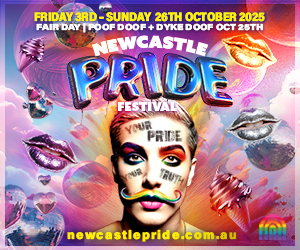The Flying Bats Football Club: Championing Inclusivity and Visibility in Sport
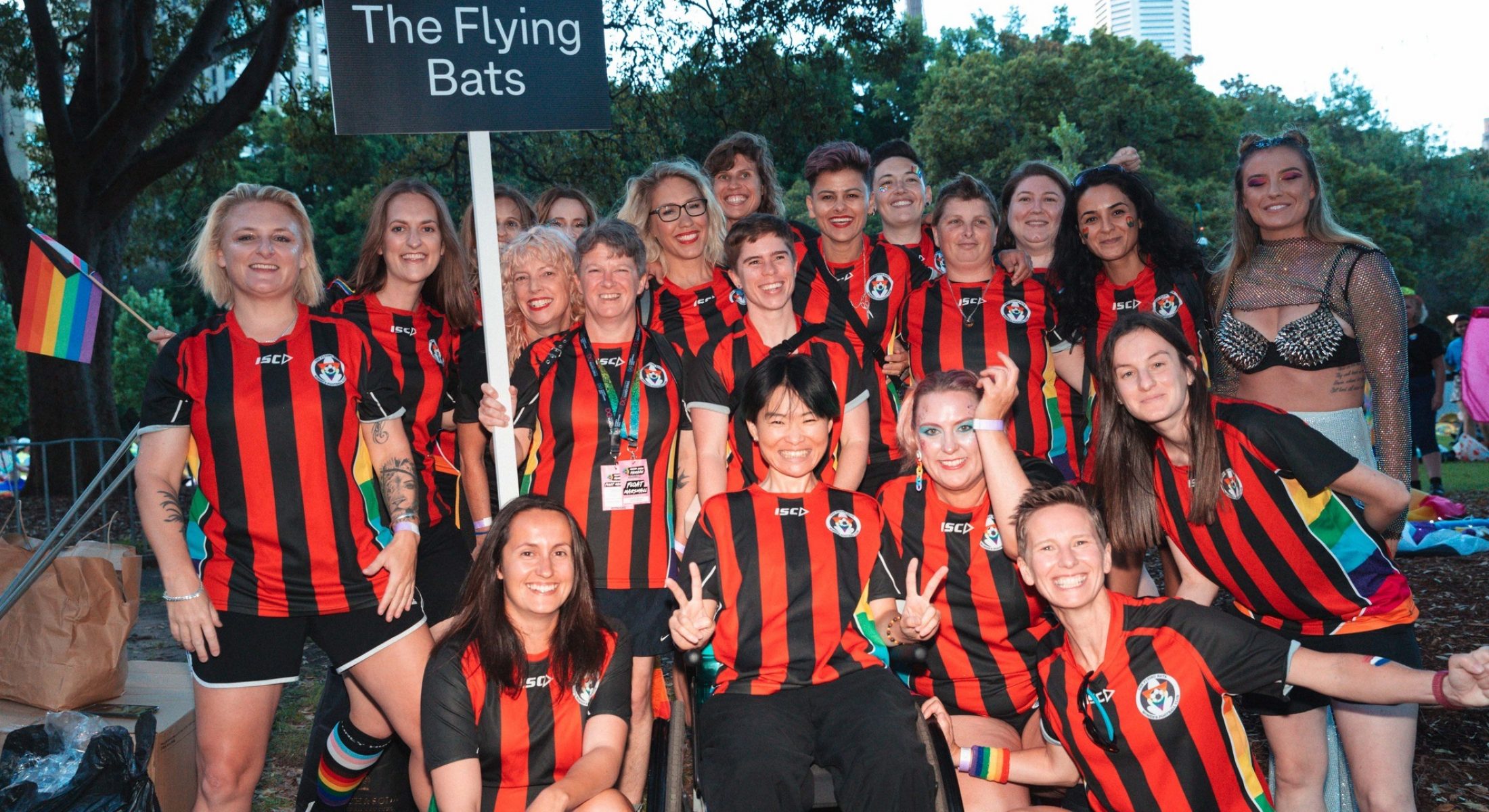

The Flying Bats Football Club was founded in 1985 and has now become one of the oldest and largest LGBTQIA+ sporting clubs in the world. Formed as a safe space for a group of lesbians to feel visible and welcome, it has now grown into a beacon of inclusivity in Sydney and beyond. As the club approaches its 40th year, it continues to be on the forefront of championing visibility and diversity in sport. Club President Jen Peden (she/they) – who is a finalist for this year’s Honour Awards – and Vice President Sam Lewis (she/they) provide some insight into the mission of the Flying Bats and what it's like to be part of such an influential LGBTQIA+ community group.
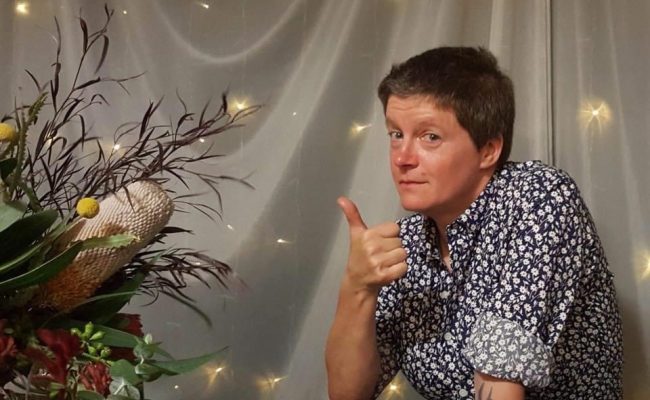
Jen first started with the club in 2007, after a friend gave her the encouragement she needed to become more involved with LGBTQIA+ social and community groups in Sydney. After playing sports most of their childhood – particularly basketball and rugby league – Jen took a break during their studies. At 35, after reigniting their involvement in sport, Jen fell in love with soccer.
Over her time with the Flying Bats, Jen has certainly achieved her initial aim of becoming involved in the community, having made lifelong friends who have now seen her through critical moments in her personal life. As Jen describes it, “when life gets rough, through moving house, break ups, ill health, grief or loss, your friends in the Bats are there to catch you and support you. To wrap their arms around you and hold you up until things get better, and then to celebrate with you when they do.”
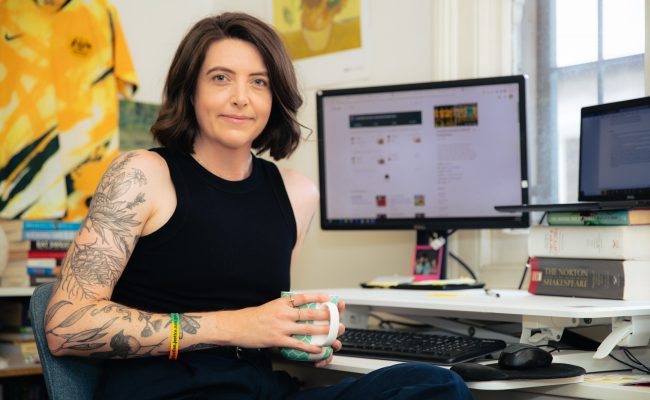
Sam is a more recent addition to the Flying Bats family, having joined three years ago. They have always had a love of sport and played football every year growing up. As an adult, they kept that passion alive through their career as a sports journalist, but they missed being out on the field. After starting a new job, Sam decided she needed to push herself in her personal life as well. Sam had previously written about the Flying Bats and decided joining them was the perfect way for her to get back into sport as a player, in an environment that she knew would welcome her with open arms. They explain that “grassroots football is a really special space, and the one where the vast majority of people engage with sport in their everyday lives. Coming back and being part of that again reminded me of just how important sport is to our sense of identity and community, in addition to our overall health and wellbeing, particularly for those living on the margins of mainstream society.”
For Sam, being a part of the Flying Bats means carrying on the legacy of the women who founded the club and pioneered its core values of inclusion: “It's one of the honours of my life to represent the Flying Bats, not just on the Committee but simply as a player, walking out onto the pitch every weekend with my rainbow jersey, surrounded by my friends, playing a game we all love and feeling free to be ourselves in the process.”
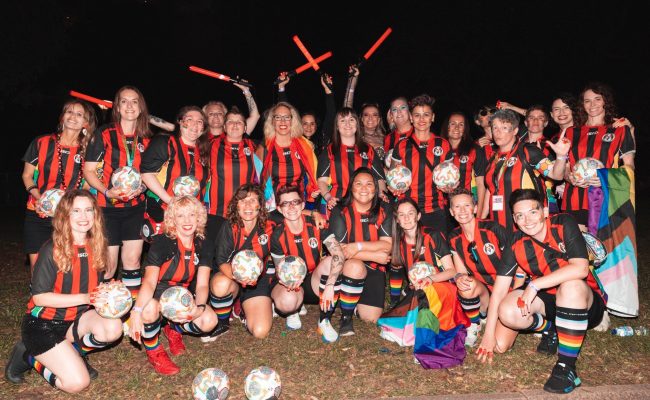
The Origins of the Flying Bats
As Jen explains it, the Flying Bats Football Club was initially founded as “one team of friends based around a lesbian sharehouse in Camperdown.” Sam adds that “back in 1985, when a group of lesbians in Sydney decided they wanted to start a soccer team, it was driven by a deep desire to create a safe and inclusive environment for any lesbian women who wanted to be part of it. Not only did they want to move away from the typical bars and clubs where they would usually gather, but they also wanted to be seen outside of those spaces: to be visible out in the world, in sport, being regular humans, having a great time.”
Over the years, the club has seen significant changes and immense growth, now with eight teams. However, those core values of creating a safe and inclusive environment have only gotten stronger over time. Jen explains: “We’ve grown and changed as our community has, we’re very proudly trans inclusive, we’ve got players from their twenties through to their fifties, and we’ve become more culturally diverse, we have players with a whole range of gender expressions and sexualities…We’ve actively worked to ensure the Club is inclusive, progressive and committed to providing a positive space for cis and trans LGBTQIA+ women and non-binary people.” She adds “What I think hasn’t changed from our inception is a sense of joy, fun, belonging, a commitment to social justice, love of the Inner West and a DIY can do attitude! Some lesbian stereotypes are there for a reason.”
It’s quite a feat for a volunteer-run club to see the success and expansion that the Flying Bats have, but, to Jen and Sam, it’s no surprise that the club is now almost in its 40th year. Jen says “It’s no small thing to have been able to achieve that longevity and growth. I think the unique factor is how invested Bats are in the Club. There’s a real love for it.” Sam adds that “Queer people are a resourceful bunch - in part because we've had to be throughout our lives…The Bats has been carried on, year after year, by passionate queer volunteers, all of whom understand right down to their bones just how important this space and community is. They've given so much unpaid time and energy and effort to trying to make this club a welcoming, wonderful space for old and new players alike, and to try and push it just a little bit further, and make it a little bit better, for whoever comes into it next. Being one small piece of that larger puzzle of people is an immense joy.”
The Values of the Flying Bats
Since its inception, the Flying Bats have had a strong focus on inclusivity and visibility. These values have been unwavering over the last four decades, and, according to Jen and Sam, they have even expanded and strengthened over time.
Since the 80s, the LGBTQIA+ community has grown and changed, and the Flying Bats have worked to ensure that everyone under the queer umbrella is included. Jen explains that “inclusivity is integral to who we are and everything we do…We’re here for all of the communities in the LGBTQIA+ acronym, not just some.” She goes on to explain that the club is dedicated to being progressive in its approach to inclusivity: “We see the Club as a place where people can be and become their full selves, that they can feel a real sense of belonging, and that they can grow and change within the club. That’s what inclusivity allows for: an expansive, abundant, embracing approach to life.” Sam shares this sentiment, adding that “as the club has evolved, so too has our culture of inclusion: we've opened our arms to more and more people across the LGBTQIA+ community, including bisexual women, trans women, non-binary players, and even straight allies, because we know that we are also always learning and changing with the times, and we want to ensure we're as welcoming and inclusive as we can be.”
The club also has been resolute in its commitment to visibility, something that was such a driving force for the lesbians who originally founded the Flying Bats. Sam feels that their participation as a player is contributing to raising visibility and awareness for the queer community, especially for those in participating in sport: “Every time we run out onto the field wearing our rainbow uniforms, we are sending a message about the kind of world we want to live in, and I'd hope that our visibility and representation in football inspires others to follow in our footsteps.”
Jen, too, has seen the impact the Flying Bats has had on LGBTQIA+ representation in sport. She explains that “we’ve definitely raised the visibility of LGBTQIA+ women and non-binary people here in Sydney and beyond. We’ve taken teams to LGBTQIA+ tournaments and festivals around the world, we’re Mardi Gras regulars, and we’re always up for a beer or coffee and a chat. We’ve been role models on the football field and off. By being visibly out and proud, we’ve paved the way for others to be out in their own teams and lives.”
In recent years, the club’s commitment to inclusivity and visibility has been especially crucial, amidst what Sam describes as “waves of attack” from the media around the inclusion of trans, non-binary, and gender diverse players in sport. According to Jen, “the Bats have been something of a guiding light. We’ve been at the forefront of trans inclusion in sport, advocating for trans people, creating and sharing policies to support this, and actively supporting trans and gender diverse Bats to play and thrive within the Club and beyond.”
Despite criticism from the media, Jen and Sam both consider it incredibly important that the Flying Bats remain steadfast in their support and inclusion of trans and gender-diverse players. As Jen explains, “Visibility can be a double-edged sword in that you can become a target for negative, homophobic and transphobic attacks, but it is worth it. LGBTQIA+ people can’t and won’t be pushed back into closets or denied the respect and dignity non-LGBTQIA+ people often take for granted.”
The Legacy of the Flying Bats
In addition to their work in the space of inclusivity and visibility in sport, the Flying Bats consistently find ways to give back to their community and to improve community sport for all LGBTQIA+ players.
Sam explains that the Bats have been involved in several large-scale initiatives, like “co-hosting the International Gay & Lesbian Football Association tournament during Sydney WorldPride, regularly marching in Mardi Gras, taking part in Pride initiatives with other football clubs and teams, and even appearing in some cool LGBTQIA+ advertising and marketing campaigns with Matildas players!” For her, however, the most important initiatives are the ones a little closer to home. They explain that “the biggest impact we've had as a club has been in the quieter, finer details: helping different football bodies put together Inclusion & Diversity policies [and] holding associations accountable for their lack of action when it comes to abuse and harassment of players at the grassroots level.” They are honoured to be a part of the Flying Bats’ legacy, and are “incredibly proud that we make a real difference in policy and in people's lives because of who we are and what we stand for.”
Expanding their impact beyond the world of sport, Jen says that the Flying Bats give back by getting involved in charity work and volunteering within Sydney’s LGBTQIA+ community. The club is a supporter of the Red Rattler, a queer-led creative community space which supports arts, activism, and thriving queer culture. Along with sponsoring an award that empowers local queer creatives at the Red Rattler, the Flying Bats also show up in the audience and sometimes on stage to support Queers of Joy, a performance night hosted at the venue that uplifts trans and gender-nonconforming artists. Jen adds that their work in the community goes hand in hand with a staunch anti-racism policy: “we wear the logo for the #RacismNotWelcomeHere campaign on our playing shorts to remind ourselves every day and spread the message of anti-racism whenever we compete.”
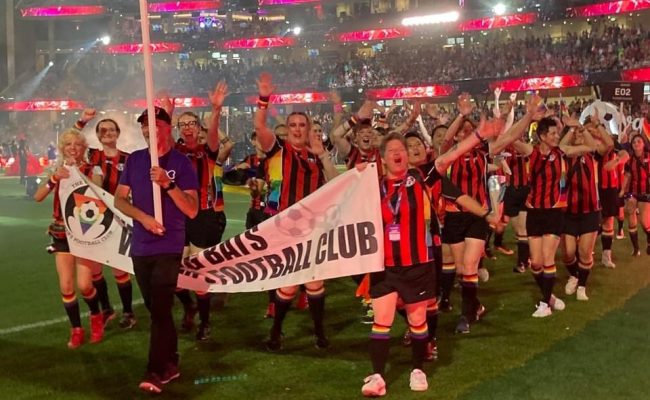
The Importance of Community
The Flying Bats have had a wide-reaching positive impact on their community and on community sport at large. But Jen and Sam also wanted to highlight the benefits that community groups have on the individual players.
Providing people with a safe place to be active is a primary benefit of community sport, according to Jen. Clubs like the Flying Bats offer up a chance to try a new activity or reignite a love of sport in a safe and welcoming environment. They add that “queer bodies taking part in sport as a form of embodiment and self-expression and taking up space is something to be celebrated.”
Jen also feels that, because LGBTQIA+ can often feel isolated or excluded, building connections through community groups is essential. They elaborate that “Connection and community are incredibly important for everybody’s wellbeing…opportunity to meet like-minded people and expand your social network is good for your mind and soul.”
Sam builds on this idea of community as an essential resource for queer people:
“Community social groups are important for everybody, but particularly for LGBTQIA+ and other marginalised folks who have had to navigate additional difficulties throughout their lives. Whether it's internalised or externalised discrimination, rejection from family or friends, threats of violence or assault, to simply feeling like they don't belong anywhere, creating spaces where these people can come together and share their stories and journeys is incredibly powerful, and can also be incredibly healing. We often talk about our "chosen families" in the queer community because countless people have been abandoned or rejected by their birth families, and I think there's an especially nice parallel with the way that sports teams often become our second families, too: these are groups that we choose to belong to, and where we can set the boundaries of our relationships with them, rather than having those things dictated by others who may not understand or respect us.”
They add that finding community within such an active hobby as football helps to alleviate any pressure or anxiety people might feel around opening up and getting too personal: “the other thing I love about sport when it comes to creating these safe and inclusive social spaces is that there is no requirement for people to share their journeys or traumas if they don't want to, or if they're not ready for that: we're all just here to take part in an activity we all enjoy, with no pressures or expectations beyond it. You can make it exactly what you want it to be, and the sport will always be there for you in one way or another.”
Getting Involved in the Community
To some, it may seem easier said than done to get involved in community activities like the Flying Bats and build these important connections. Jen and Sam both have advice for any queer folks who want to make more time for community but feel hesitant to take the first step.
They both had the same initial response to the question, which was “do it!” For Jen and Sam, jumping in head first is the best way to get over your hesitations. Jen explains it as “a leap of faith,” while Sam describes it as “throw[ing] caution to the wind and simply rock[ing] up.”
Jen elaborates, saying that “it initially feels daunting for almost everyone…but your local queer community, especially queer community sporting groups, will welcome you with open arms. You’ll find friends, colleagues, partners, chosen family, belonging, support and confidence. And once you join, you are part of shaping and sustaining that community. You get to put your stamp on it and make it a space for every new queer person who follows you in joining. We are the community. You are the community.”
Sam recommends finding an activity that you’re interested in and seeking out a queer social group that engages in that activity. She asks “What activities or hobbies do you enjoy? I can guarantee you there's a queer version of that somewhere out there which you can be part of. The activity, really, is an excuse to talk to strangers about things you both like doing, and isn't that what friendship and community is all about?”
For anyone living in or visiting Sydney, getting involved with the Flying Bats might be the perfect jumping off point for more involvement in the LGBTQIA+ community. Jen explains that “Lots of folks join the Bats because they are new to Sydney either from overseas, interstate or regional areas, are newly active in the community or looking to find friends and community. Lots of Bats are new to football. You are never the only one.”
There are also ways to get involved with the Flying Bats aside from playing on one of the teams. Jen says that the Bats always welcome supporters at their matches, with their eight teams playing games every Sunday from April to August. She adds that “we’re also pretty social and welcoming – Sundays after games at our sponsor, the Golden Barley Hotel in Enmore, the heart of the LGBTQIA+ friendly Inner West – and at a range of social events throughout the year. Everything from picnics to parties.” Following the club on social media will ensure that you stay up to date with their games and events throughout the year.
Sam adds that the club is also planning to create a membership tier “where folks who might not want to play football can still donate a bit of money and get access to a whole bunch of cool stuff like events and merchandise that all our regular members enjoy.”
Travel Tips from the Flying Bats
Being so well established in the Sydney queer community, Jen and Sam both have recommendations for any LGBTQIA+ travellers to Sydney who want to get the most out of their experience, or for any locals who are wanting to expand their comfort zone!
If you’re visiting Sydney in the summer months and want to get involved with the Flying Bats in the short term, Sam recommends attending some of their free summer training sessions. They explain that the sessions are “totally casual, run by experienced coaches, and are open to anybody - from people who've never played before in their lives through to those who've never missed a season.” The summer training sessions will be held weekly from November to February, with updates and announcements across the club’s social media accounts. Sam adds that “if you don't want to get all hot and sweaty [playing soccer], I highly suggest checking out Newtown, which has heaps of awesome bars and op-shops and restaurants (as well as a Pride Square!) right in the heart of the Inner West, or the iconic Oxford Street in Darlinghurst where the Mardi Gras parade is held every year!”
Jen also has an exhaustive list of the best queer hotspots in Sydney. They recommend checking out the following places across Sydney, from bars and pubs to scenic suburbs:
“The Bearded Tit in Redfern is the best little queer bar in town! Check out Queerbourhood on a Wednesday night. There are plenty of great parties put on by Late Night/All Day Queer Dance, Heaps Gay, Loose Ends, Bad Dog and House of Mince. But you can’t come to Sydney and not catch a drag show at the Imperial, Erskineville (aka the Impy) and a dance to some cheesy tunes at Palms on Oxford Street.
Catch an edition of Queerstories if you can. Running regularly at the Grand Electric on Cleveland Street and sometimes in Parramatta or other venues as part of festivals, it features famous and little-known queer community members alike telling stories that are funny, beautiful, sad, silly and everything in between. Plus, some pretty fab people watching amongst the audience.
The Red Rattler Theatre in Marrickville hosts queer parties and performances. The Inner West’s pubs and craft breweries are famed for a reason, and Marrickville has become a centre for great cafes, restaurants and distilleries too. I’m a big fan of Two Chaps.
In Darlinghurst and Surry Hills, start with a stroll along Crown Street, then a Four Pillars gin cocktail at Eileen’s Bar and kick on to the Beresford.
Check out the rainbow steps at Coogee Beach and some of the ocean pools along the Eastern Suburbs coastline, especially McIver’s Ladies Baths, also at Coogee. Sydney’s beaches really do sparkle.
For quieter times, my favourite spots are the Royal Botanic Gardens and Art Gallery of NSW. The Gallery is open late on Wednesday nights for Art After Hours and hosts LGBTQIA+ themed events during Mardi Gras. Check out the new pavilion, Naala Badu. The Tank space there is something else.”
Whether you want to get involved with the queer community on the playing field or over a beer, there are plenty of amazing places to check out in Sydney.
Conclusions
Social groups like The Flying Bats Football Club are such essential parts of LGBTQIA+ community and culture, providing safe spaces for queer folks to thrive, form connections, and just have fun. From boosting visibility to supporting local LGBTQIA+ initiatives to looking out for the wellbeing of gender diverse athletes, Jen, Sam, and the whole Flying Bats team are doing incredible work. Learn more about the club and upcoming events on their website, Instagram, or Facebook.

